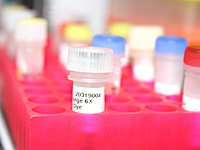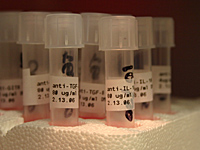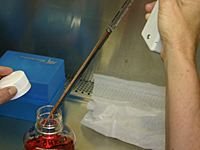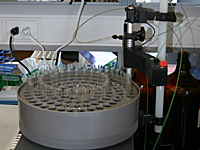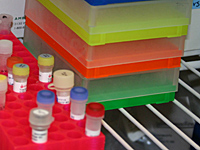News
February 2013
VRISD In the Press
Newly Elected President/CEO
VRISD is pleased to announce the election of John Welsh, Ph.D., as President/CEO by the board of directors. Dr. Welsh joined VRISD in June of 2010 as an Associate Professor. His group's research interest is in exploiting molecular methods to develop novel methods for tracing the order of mutation occurrence, the nature of the mutated genes and their distribution in order to enhance the understanding of the molecular basis of cancer. The hope is that this may lead to novel diagnostic paradigms.
April 2011
VRISD In the Press
New Tool Allows for Alternate Prostate Cancer Diagnosis
Researchers at the Vaccine Research Institute of San Diego (VRISD) and at University of California, Irvine, have found that it may not be necessary to look for tumors directly in patients with prostate cancer — analyzing non-tumor tissue may be an effective option, according to study results published in Cancer Research, a journal of the American Association for Cancer Research.
September 2010
VRISD In the Press
Humanized mice may provide clues to better prevent and treat typhoid fever
Better treatments and prevention for typhoid fever may emerge from a laboratory model that has just been developed for the disease. The model is based on transplanting human immune stem cells from umbilical cord blood into mice that are susceptible to infections.
VRISD In the Press
Mice Engrafted With Human Immune Cells May Provide Clues to Better Prevention and Treatment of Typhoid Fever
The transplanted cells live alongside the mouse's own immune system. Although mice are normally resistant to the dangerous strain of Salmonella that causes typhoid fever, the bacteria are able to reproduce in the mice that have received transplanted human cells.
VRISD In the Press
Salmonella responds differently to tomato varieties, ripeness
VRISD collaborating with University of Florida researchers have discovered that tomato variety and maturity influence the ways salmonella bacteria respond to the fruit.
VRISD In the Press
In silico methods for estimating tissue percentages in tumors
Researchers from Vaccine Research Institute of San Diego and University of California, used prostate cancer microarray data to estimate tumor and normal cell content in clinical samples. This information improves the ability to detect differences in gene expression between patients.
July 2010
VRISD News
Patent Issued to VRISD by USPTO
In July, 2010, VRISD received a Notice of Allowance from the USPTO for a patent covering vaccine platforms and methods using rodent hepatitis B virus core proteins. This patent will both complement and strengthen VRISD's current patent portfolio of vaccine platforms surrounding the hepatitis virus core proteins.
November 2009
VRISD News
New adjunct faculty joins VRISD
Dr. Christa E. Müller-Sieburg and Dr. Hans B. Sieburg are at the Sanford-Burnham Medical Research Institute in La Jolla, California. Dr. Christa E. Müller-Sieburg is well known in the research field of hematopoietic stem cells and has of published and cited peer-reviewed journal articles in the field. Dr. Hans B. Sieburg is equally known as a mathematician and statistician. He has collaborated with Christa on quantitative stem cell biology. They are long time colleagues of Dr. John Welsh at VRISD and are a welcomed addition to our team.
September 2009
VRISD News
VRISD is awarded a new grant to research Malaria
This four year award from NIH was awarded to Dr. David Milich at VRISD and Dr. Fidel P. Zavala at Johns Hopkins University in Baltimore, MD. This project is entitled "Multiepitope Circumsporozoite P. falciparium Malaria Subunit Vaccine Displayed on Virus-Like-Particles (VLPs)." Dr. Darrell Peterson at the Virginia Commonwealth University will also be a collaborator on this award. This project is aimed at the fact that Malaria is the world's most important lethal tropical parasitic disease (1.5 to 2.7 million deaths each year) with an estimated 300-500 million clinical new cases each year. The natural P. falciparum infection does not result in effective immunity, and malaria control efforts are being impeded by the spread of multiple drug resistant P. falciparum and the development of insecticide resistance by the anopheline mosquito vector. Therefore, a prophylactic vaccine is urgently needed to prevent further spread of this disease. The overall objective of this proposal is to develop a P. falciparum malaria-specific immunogen that may be useful as an affordable and effective vaccine to prevent malaria.
July 2009
VRISD News
VRISD is awarded an ARRA Grant
This two year award was given to Dr. Michael McClelland and colleagues from the NIH. It is entitled "Salmonella Genes Associated with Colonization of Specific Hosts". Dr. McClelland will work in collaboration with Dr. Helene Andrews-Polymenis at Texas A & M University Research Foundation and Dr. Brian M. Ahmer at Ohio State University. The importance of this project is that Salmonella is a major pathogen of humans and of domestic and wild animals, causing major medical and economic damage. One type of Salmonella, Typhimurium, can colonize and persist in many different species. As of early 2008 there was no active NIH-funded project to identify new genes involved in host range in Salmonella. Such studies may be a key to battling this versatile pathogen. This study will reveal potential new vulnerabilities of this pathogen that may lead to the design of new therapeutic strategies, and will provide principles for understanding other pathogenic relatives of Salmonella, such as E. coli.
VRISD News
VRISD is moving
Due to our recent expansion VRISD is moving locations. We are moving to the Torrey Pines area of San Diego. We will now be located in the Science and Technology corridor of San Diego close to The Scripps Research Institute, The Sanford-Burnham Institute, Salk Institute and the University of California San Diego. Our new location is 10835 Road to the Cure, Suite 150, San Diego, CA 92121.
VRISD News
New Faculty Members join VRISD
VRISD has expanded through the addition of a team of scientists from the Sidney Kimmel Cancer Center. Joining the Institute are Dr. Michael McClelland as Full Member and the new Scientific Director; Dr. Per Borgstrom and Dr. John Welsh as Associate Members; and Dr. Veronique Baron as Assistant Member. These distinguished scientists bring to the VRISD targeted cancer research. They have been funded though the National Institute of Health, the Department of Defense, and the State of California (California Breast Research Program). Other scientists that have joined VRISD as a part of their team are Dr. Parisa Abedinpour, Dr. Rocio Canals, Dr. Steffen Porwollik, Dr. Gaelle Rondeau, Dr. Yipeng Wang, and Dr. Xiao-Qin Xia.
November 2007
VRISD News
Second Patent Issued to VRISD by USPTO
VRISD has received an Issue Notification for a second patent. This highly valued invention relates to the compositions and methods of comprising recombinant hepatitis virus core proteins or nucleic acids for use in vaccine formulations. The granting of this patent further strengthens VRISD's ability to exploit this proprietary technology for the purpose of developing sorely needed vaccines for diseases such as malaria, HIV and HCV.
VRISD News
VRISD Recruits New Faculty Member
VRISD is pleased to announce the recruitment of David C. Whitacre, Ph.D., from the UCSD Moores Cancer Center in La Jolla, California. Dr. Whitacre will hold dual appointments at the VRISD and VLP Biotech. Dr. Whitacre's most recent work has been in the construction of chimeric genes and adenovirus vectors to use in gene therapy clinical trials. Additionally, he contributed to the on-going development of optimal infection conditions of human leukemic cells for therapeutic use in patients enrolled in cancer vaccine clinical trials.
October 2007
VRISD News
VRISD Granted Patent Coverage in Australia
VRISD has received notification of patent coverage of its vaccine platform technology in Australia. This coverage further strengthens VRISD's ability to exploit this exciting technology.
December 2006
VRISD News
NIH Renews 25+ Year Study
A group of scientists led by the VRISD President David R. Milich, Ph.D., has received a renewal award from the NIH to continue the study of mechanisms of chronicity in HBV infection. Chronic HBV infection can lead to serious disease such as liver cirrhosis and/or hepatocellular carcinoma. With 360 million chronic carriers worldwide, understanding the mechanisms involved in chronic infection could lead to effective treatments for this life threatening disease.
VRISD News
Patent Issued by USPTO
VRISD has received an Issue Notification for a patent filed with the USPTO in July, 2003. This patent will allow VRISD to capitalize on its methods and use of the human hepatitis B virus core protein as a vaccine platform.
November 2005
VRISD News
Antigenicity and Immunogencity of Hepadnavirus Core Proteins Compared
The hepatitis B virus core protein (HBcAg) is a uniquely immunogenic particulate antigen and as such has been used as a vaccine carrier platform. The use of other hepadnavirus core proteins as vaccine carriers has not been previously explored. This study published by VRISD scientists, demonstrates: 1) rodent core proteins are equal in immunogenicity to, or more immunogenic than HBcAg and 2) rodent core proteins are not significantly cross-reactive with HBcAg at the antibody level. (Journal of Virology 79:13641; Nov. 2005)
VRISD News
New Particulate Carrier Platform Revealed
The particulate hepatitis core protein (HBcAg) represents an efficient carrier platform with many of the characteristics uniquely required for the delivery of weak immunogens to the immune system. However, this platform technology has a number of theoretical and practical limitations, most notably the "preexisting immunity" and "assembly" problems. To address these problems a team of scientists at the VRISD has developed the core protein from the woodchuck hepadnavirus (WHcAg) as a new particulate carrier platform system. (Journal of Virology 79:13656; Nov. 2005)
March 2005
VRISD News
Study Reveals Three Phenotypes of HBe/HBcAg Tolerance
A team of scientists at the VRISD has published a study showing that immune tolerance maybe split between HBV precore and core proteins. This study showed that the secreted HBeAg is significantly more efficient than the intracellular HBcAg at eliciting T-cell tolerance. This observation may have significant implications for natural HBV infection and especially for precore-negative chronic hepatitis. (Journal of Virology 79:3016; Mar. 2005)
October 2004
VRISD News
A Function of the Hepatitis B Virus Precore Protein Revealed
The function of HBeAg has been the subject of speculation since its discovery greater than 30 years ago because it is not required for viral infection, replication or assembly. A group of researchers at the VRISD has demonstrated unambiguously that serum HBeAg can function as an efficient T cell tolerogen and can down-regulate the immune response to HBcAg in a transgenic system in which HBcAg is a strong immunogen. This HBeAg-mediated immune regulation may predispose individuals to chronicity during perinatal infection and prevent severe liver injury during adult infection. (Proceedings of the National Academy of Sciences 101:14913; Oct. 2004).
September 2004
VRISD News
Vaccine Platform Study Renewed
A team of scientists at the VRISD has received a five year, $2.8 million NIH grant in order to continue the process of optimizing a vaccine carrier platform. This platform has shown great promise due to its ability to convert historically weak immunogens into strong ones. Candidate diseases in which weak, yet neutralizing epitopes have been identified such as HIV and malaria will be a focus of this study for proof of principle.
July 2004
VRISD News
PCT Filed for Vaccine Platform
In July 2003, the VRISD filed two patent applications with the USPTO covering various aspects of its proprietary vaccine platform technology. Subsequently, international coverage of the same technology was filed for in July, 2004. This patent portfolio coupled with several sources of funding to exploit the platform, places the VRISD in a position to develop very exciting prophylactic as well as therapeutic vaccines for diseases such as cancer, HIV, HCV and influenza.
VRISD News
The VRISD to Receive $1.5 Million for Flu Vaccine Development
The VRISD has been selected to participate in a project grant funded by the NIH and awarded to Washington University in St. Louis, Missouri. Historically, flu vaccines have targeted epitopes that have a high rate of mutation, necessitating annual production of vaccines targeting newly emerged strains. The focus of this study will be on a highly conserved influenza virus protein that has been shown to elicit antibodies which inhibit influenza virus replication. The challenge hindering such a strategy has been that in the past a method of rendering this conserved B cell epitope highly immunogenic has been limiting. However, a property of VRISD's vaccine platform is its ability to convert weak immunogens into strong immunogens. It is hoped this vaccine platform will overcome limiting immunogenicity, yielding high titer antibodies that will be annually relevant thus ending the need for annual vaccine production and vaccination.
May 2004
VRISD News
The VRISD Receives Funding for Vaccine Development
The VRISD has received a grant for $303,000 from VLP Biotech over two years to develop new vaccines using its proprietary vaccine technology. This project will target influenza, allergies, Alzheimer's and high cholesterol.
October 2003
VRISD News
The VRISD Forms New Vaccine Company
The VRISD has formed a new vaccine development company together with Tripep, a Swedish biotechnology research company. The new company, VLP Biotech, will be based in San Diego, California. Tripep's initial investment will be $500,000 over two years. VLP Biotech will be focusing its research on developing and commercializing proprietary virus-like particle technology owned by the VRISD. This technology consists of a promising vaccine platform which is capable of converting historically weak immunogens into strong immunogens.
January 2002
VRISD News
VRISD Expands to an International Team
VRISD is pleased to have recruited three world class scientists as Adjunct Members with expertise in vaccine research, molecular virology, biochemistry and cellular immunology. Matti Sallberg, D.D.S., Ph.D., is a Professor at the Karolinska Institute in the Division of Clinical Virology. Professor Sallberg's areas of expertise include human and murine immune responses to hepatotropic viruses such as the hepatitis B virus, hepatitis C virus, and the GB virus C. He serves as the co-coordinator of a project founded by the European Community aimed at developing a therapeutic vaccine for chronic hepatitis C virus infections and acts as a scientific expert reviewer for Swedish national and international foundations including the European Community. Margaret Chen, D.D.S., Ph.D., is a researcher at the Swedish Institute for Infectious Disease Control and an Associate Professor at the Karolinska Institute in Stockholm, Sweden. Professor Chen's research interests include immune mediation by toll-like receptor 3 and the role of MyD88 in cross-presentation of virally infected cells. Dr. Chen serves as a reviewer for American Journal of Pathology, Vaccine, Cancer Detection and Prevention, European Respiratory Journal, and Scandinavian Journal of Immunology. Darrell Peterson, Ph.D., is a Professor in the Department of Biochemistry at Virginia Commonwealth University in Richmond, Virginia. Dr. Peterson has enjoyed a distinguished career studying the structure and functions of viral proteins and is considered an expert in the expression and purification of HBV proteins.
Home | About VRISD | News | Research | Publications
Careers At VRISD | How To Help | Contact Us
© VRISD 2006











 Read Full Press Release
Read Full Press Release